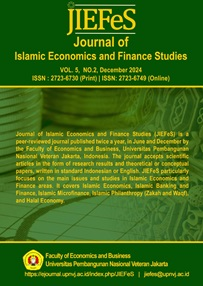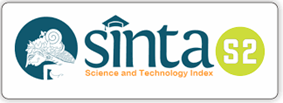Empowerment of Community Creative Economy Through the Islamic Education Assembly (Majelis Taklim)
DOI:
https://doi.org/10.47700/jiefes.v5i2.10159Keywords:
Creative economy; Empowerment; Majelis taklim.Abstract
The activities of the Islamic Education Assembly require intervention in the form of empowerment through the strengthening of productive socio-economic capacities. In addition to focusing on its main activities in Islamic studies, the Islamic Education Assembly also organizes creative economic activities conducted by its members. However, these activities face challenges such as limited connections with external communities, dependency on others, and inadequate facilities and infrastructure that affect the effectiveness of community-based economic empowerment. This study aims to uncover the patterns and strategies of community economic empowerment used by the Islamic Education Assembly administrators and facilitators, as well as to identify the supporting and inhibiting factors in the empowerment process. The research adopts a qualitative approach, utilizing fieldwork through interviews, observations, and document analysis. The findings reveal that the empowerment process is carried out through a bottom-up approach based on the community's own initiatives. The Mezzo-Level Strategy was effectively implemented, focusing on empowering groups through education and training. Supporting factors include (a) high community participation, (b) loyalty of the congregation and community, (c) demands from congregants and members for training, (d) strategic location, and (e) flexible timing. Conversely, the key inhibiting factors are (a) limited connections with external communities, (b) dependency on others, and (c) inadequate facilities and infrastructure. These findings suggest that fostering community participation, strengthening institutional systems, and reducing dependency are critical for achieving sustainable community empowerment. The study highlights the potential of the Islamic Education Assembly to drive socio-economic development through creative economic activities tailored to local needs, provided the challenges are addressed strategically.
Kegiatan Majelis Taklim membutuhkan intervensi dalam bentuk pemberdayaan melalui penguatan kapasitas sosial ekonomi produktif. Selain fokus pada kegiatan utama dalam kajian keislaman, Majelis Taklim juga mengadakan kegiatan ekonomi kreatif yang dilakukan oleh para anggotanya. Namun, kegiatan ini menghadapi tantangan berupa kurangnya koneksi dengan komunitas luar, ketergantungan terhadap pihak lain, dan keterbatasan fasilitas serta prasarana yang memengaruhi efektivitas pemberdayaan ekonomi berbasis komunitas. Penelitian ini bertujuan untuk mengungkap pola dan strategi pemberdayaan ekonomi masyarakat yang digunakan oleh pengurus Majelis Taklim dan pemberdaya serta menemukan faktor pendukung dan penghambat dalam proses pemberdayaan tersebut. Metode penelitian menggunakan pendekatan kualitatif dengan penelitian lapangan melalui wawancara, observasi, dan analisis dokumen. Hasil penelitian menunjukkan bahwa proses pemberdayaan dilakukan dengan pendekatan bottom-up yang didasarkan pada inisiatif masyarakat sendiri. Strategi pemberdayaan yang diterapkan menggunakan Strategi Aras Mezzo, yang berfokus pada pemberdayaan kelompok melalui pendidikan dan pelatihan. Faktor pendukung meliputi (a) tingginya partisipasi masyarakat, (b) loyalitas jamaah dan komunitas, (c) permintaan pelatihan dari jamaah dan anggota, (d) lokasi strategis, dan (e) waktu yang fleksibel. Sebaliknya, faktor penghambat utama adalah (a) keterbatasan koneksi dengan komunitas eksternal, (b) ketergantungan pada pihak lain, dan (c) fasilitas serta infrastruktur yang tidak memadai. Hasil Temuan dari penelitian ini menunjukkan bahwa meningkatkan partisipasi masyarakat, memperkuat sistem kelembagaan, dan mengurangi ketergantungan merupakan langkah penting untuk mencapai pemberdayaan masyarakat yang berkelanjutan. Penelitian ini menyoroti potensi Majelis Taklim dalam mendorong pengembangan sosial-ekonomi melalui kegiatan ekonomi kreatif yang disesuaikan dengan kebutuhan lokal, asalkan tantangan-tantangan tersebut dapat diatasi secara strategis.
References
Amri, M., Asfahani, A., Kadeni, K., & ... (2024). Community Empowerment In The Fields Of Education Entrepreneurship And The Environment In The Village. Communnity Development Journal, 5(2), 3704–3712. http://journal.universitaspahlawan.ac.id/index.php/cdj/article/view/27411%0Ahttp://journal.universitaspahlawan.ac.id/index.php/cdj/article/download/27411/19114
Astutiningsih, S. E., & Sari, C. M. (2017). Pemberdayaan Kelompok Agroindustri Dalam Upaya Mempercepat Pertumbuhan Ekonomi Jawa Timur. Jurnal Ilmu Ekonomi Terapan, 2(1), 1–9. https://doi.org/10.20473/jiet.v2i1.5500
Barella, Y., Ondeng, S., & Saprin. (2024). Peranan Majelis Taklim Dan Lembaga Dakwah Dalam Pengembangan Pendidikan Islam: Sebuah Analisis Fungsional. Jurnal Review Pendidikan Dan Pengajaran, 7(2), 4868–4876. http://journal.universitaspahlawan.ac.id/index.php/jrpp
Chusumastuti, D., Kartika, D. G., Jumiati, E., Zaini, M., Hasanah, D. F., Yuliantina, D., Nandiroh, U., Meirianto, W., Hasaruddin, Zazilah, A. N., Sanjaya, A. W., & Mukti, M. (2024). KONSEP EKONOMI KREATIF. In A. Asari (Ed.), PT MAFY MEDIA LITERASI INDONESIA. PT MAFY MEDIA LITERASI INDONESIA. http://scioteca.caf.com/bitstream/handle/123456789/1091/RED2017-Eng-8ene.pdf?sequence=12&isAllowed=y%0Ahttp://dx.doi.org/10.1016/j.regsciurbeco.2008.06.005%0Ahttps://www.researchgate.net/publication/305320484_SISTEM_PEMBETUNGAN_TERPUSAT_STRATEGI_MELESTARI
Imaduddin, & Al Attas, S. M. (2022). Manajemen Majelis Taklim Dalam Meningkatkan Pemberdayaan Ekonomi Masyarakat Di Kota Samarinda Provinsi Kalimantan Timur. Nidhomiyyah: Jurnal Manajemen Pendidikan Islam, 3(2), 129–149. https://doi.org/10.38073/nidhomiyyah.v3i2.870
Kay, C. (2020). Theotonio Dos Santos (1936–2018): The Revolutionary Intellectual Who Pioneered Dependency Theory. Development and Change, 51(2), 599–630. https://doi.org/10.1111/dech.12560
Kementerian Sekretariat Negara Republik Indonesia. (2018). Peraturan Presiden Republik Indonesia No 142 Tahun 2018 tentang Rencana Induk Pengembangan Ekonomi Kreatif Nasional Tahun 2018 - 2025. Kementerian Sekretariat Negara Republik Indonesia.
Khoirulika, R., Mustafa, D., Ridwan, M. A., & Saputro, T. D. E. (2025). Strategi Pemberdayaan Masyarakat dalam Program CSR PT INALUM di Wisata Sawah Raja. Jurnal Administrasi Pemerintahan Desa, 06(01), 1–15.
Laraswati, D., Krott, M., Soraya, E., Rahayu, S., Fisher, M. R., Giessen, L., & Maryudi, A. (2022). Nongovernmental organizations as interest groups and their roles in policy processes: Insights from Indonesian forest and environmental governance. Forest and Society, 6(2), 570–589. https://doi.org/10.24259/fs.v6i2.19125
Malta. (2023). The Concept of Strategy in Community Empowerment: A Literature Review. Influence: International Journal of Science Review, 5(3), 24–34. https://doi.org/10.54783/influencejournal.v5i3.179
Merriam, S. B., & J.Tisdell, E. (2016). Qualitative Research A Guide to Design and Implementation Fourth Edition. In Jossey-Bass A Wiley Brand. http://scioteca.caf.com/bitstream/handle/123456789/1091/RED2017-Eng-8ene.pdf?sequence=12&isAllowed=y%0Ahttp://dx.doi.org/10.1016/j.regsciurbeco.2008.06.005%0Ahttps://www.researchgate.net/publication/305320484_SISTEM_PEMBETUNGAN_TERPUSAT_STRATEGI_MELESTARI
Muhammad Yunus. (2024). Majelis Taklim dan Perannya dalam Meningkatkan Kesadaran Beragama. Jurnal Budi Pekerti Agama Islam, 2(6), 116–122. https://doi.org/10.61132/jbpai.v2i6.617
Rahayu, P. R., & Hidayah, N. (2023). Pengaruh Jaringan Usaha, Inovasi Produk, dan Persaingan Usaha terhadap Perkembangan Usaha UMKM. Jurnal Manajerial Dan Kewirausahaan, 5(2), 448–456. https://doi.org/10.24912/jmk.v5i2.23415
Rakib, M. (2020). Strategies of community empowerment for the economic development in Makassar Indonesia. Man in India, 96(11), 4553–4563.
Ridho, M. A., Putra, A. E., & Jamil, M. (2023). Majelis Taklim and Its Role in Women’S Empowerment. Ijtimaiyya: Jurnal Pengembangan Masyarakat Islam, 16(1), 65–90.
Ryan Aldiansyah Akbar, Muhammad Fauzan, A. A. J. A., & Khotimatul Barki, A. (2023). Implementation Of Community Empowerment Approach To Potential-Based Economic Development Implementasi Journal Of Scientech Research And Development Potential-Based Economic Development. Journal of Scientech Research and Development, Volume 5(Issue 1). http://idm.or.id/JSCR
Sarfo, J. O., & Ofori, P. K. (2017). A Book Review: Qualitative Inquiry & Research Design: Choosing Among Five Approaches. Russian Journal of Sociology, 3(1). https://doi.org/10.13187/rjs.2017.1.30
Sarjiyanto, S., Mulki, Y. A., & Istiqomah, N. (2024). The impact of typology capital on community empowerment programs: evidence from rural development in Indonesia. Jurnal Ekonomi & Studi Pembangunan, 25(1), 17–35. https://doi.org/10.18196/jesp.v25i1.20083
Suryahadi, A., Rishanty, A., & Sparrow, R. (2024). Social Capital and Economic Development in a Large and Multi-Ethnic Developing Country: Evidence from Indonesia. Asian Development Review. https://doi.org/10.1142/S0116110524500082
Suyatna, H., Farransahat, M., Firdaus, R., Indroyono, P., & Wibowo, I. A. (2024). Challenging Social Capital to Develop Community-based Digital Economy Platform in the Traditional Market. Journal of Social Development Studies, 5(1), 1–15. https://doi.org/10.22146/jsds.11378
Wella, W. ayu diah safitri, Mawardi, M. M. J., & Jasmadi, J. (2022). Peran Pemberdayaan Majelis Taklim Pada Masyarakat Islam Desa Sukadamai Kecamatan Natar Kabupaten Lampung Selatan. Jurnal Cakrawala Ilmiah, 1(11), 2881–2886. https://doi.org/10.53625/jcijurnalcakrawalailmiah.v1i11.2538
Wibowo, T. S., Haryati, E., Fatchurrohman, M., Shobikin, & Elisabeth, D. R. (2024). Empowerment Theory For Performance Improvement : A Literature Study. International Journal of Economic, Business and Innovation Research, 03(02).
Yustikasari, Y., Gemiharto, I., & Ayuningtyas, F. (2021). The Development of Communication Model for the Empowerment of Highly Poor Villages in Pangandaran Regency, West Java, Indonesia. IOP Conference Series: Earth and Environmental Science, 819(1), 1–7. https://doi.org/10.1088/1755-1315/819/1/012038
Downloads
Published
Issue
Section
License
Copyright (c) 2025 Handayani Indah Susanti

This work is licensed under a Creative Commons Attribution 4.0 International License.
Authors who publish with this journal agree to the following terms:
- Authors retain copyright and grant the journal right of first publication with the work simultaneously licensed under a Creative Commons Attribution 4.0 International License that allows others to share the work with an acknowledgment of the work's authorship and initial publication in this journal.
- Authors can enter into separate, additional contractual arrangements for the non-exclusive distribution of the journal's published version of the work (e.g., post it to an institutional repository or publish it in a book), with an acknowledgment of its initial publication in this journal.
- Authors are permitted and encouraged to post their work online (e.g., in institutional repositories or on their website) before and during the submission process, as it can lead to productive exchanges, as well as earlier and greater citation of published work.

This work is licensed under a Creative Commons Attribution 4.0 International License.











